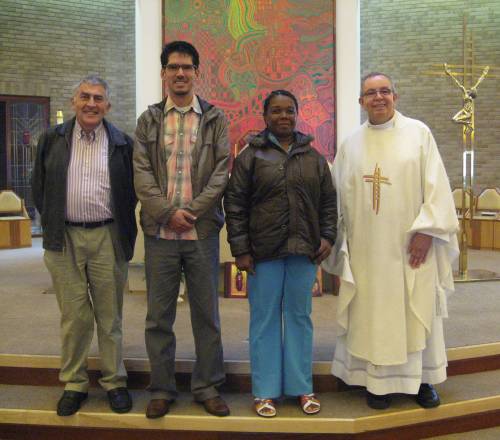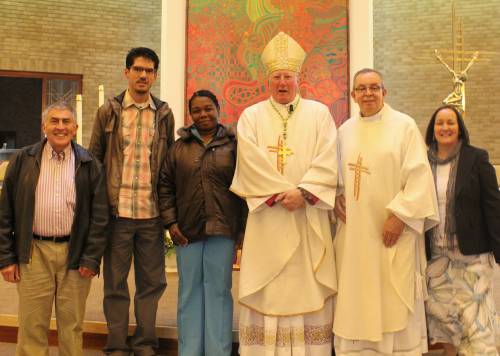4th-6th June 2011
Mgr Héctor Fabio Henao, Mélida Esther Guevara and Jesus Alberto Castilla Salazar, accompanied by Francis McDonagh, CAFOD’s Andes Programme Manager, visited Middlesbrough over the 4th–6th June to share their experiences of life in Colombia, where an internal conflict has been raging for the past 50 years.

Four million people have been driven from their land and are internally displaced, six million hectares of land have been stolen, this is an area the size of the Republic of Ireland and Wales combined. This has caused a humanitarian crisis. The root cause of the conflict is poverty and inequality and has affected especially those who depend on the land and its resources: farming communities, Afro-Colombian communities and indigenous peoples.
The Catholic Church stands alongside the poorest people in solidarity and helps them in their struggle, trying to bring about justice and reparation. It is one of the most important actors in the search for peace. It reaches the people that others cannot reach and campaigns internationally through the international Caritas network. Mgr Héctor Fabio is National Director of the Colombian Catholic Bishops’ Conference social programme, a key CAFOD partner.
Mélida is a courageous Afro-Colombian single mother and community activist who is fighting for land rights for the Afro-Colombian communities in Chocó, near the Pacific coast. Descended from Africans brought to Colombia by the slave trade, they are among the poorest people in Colombia. Families from Mélida’s community have been forced to flee their homes by attacks from the guerrillas. Their land is being taken by paramilitaries and illegal groups who are involved in open-cast mining, with the complicity of public servants, who turn a blind eye to their activities. Their organisation, Cocomopoca, meet together to petition to the government to have their lands and rights restored to them. This is a dangerous activity and many people “disappear” for speaking out.
There are still many murders among the poor of Colombia – for precious metals, gold, platinum, emeralds and oil.
Alberto is a small scale farmer and community leader who lives on the northern frontier where Colombia meets Venezuela, called Catatumbo. There is constant conflict over the mineral wealth of the region. Open-cast coal mining is devastating the farming lands in the mountain regions, which is the ancestral homeland of Colombia’s indigenous people. Coal is a precious commodity and covers an area of 56,571 hectares. It is mined for export to the US and European countries, so most Colombians do not benefit from the mineral wealth of the country’s own natural resources. Alberto is involved in trying to get the lands restored.
He told us that paramilitaries came to his village and told him he had two hours to leave or he would be killed. He had to leave his wife and two young daughters and flee to Bogota, the Colombian capital. This was not easy, as there are no roads in the mountains, only dirt tracks and the only means of transport are river buses. He cannot return to his village for fear of his life, so he only sees his daughters at Christmas.
He speaks with passion, saying there needs to be reparation, which the government promises will come – but he holds out little hope of this. He said there needs to be repentance first, by paramilitaries and guerrillas, for the murder of so many poor people before there can be reconciliation and peace. He is seeking justice for the campesino and indigenous people of the area, whose ancestral homelands are being stolen and, if that wasn’t enough have to cope with, there is all the evils that accompany the drugs trade. Coca is also grown there, the leaves of which are used to make cocaine.
The conflict is not over: communities are still being displaced and their leaders are still being murdered. But the government has passed a Victims’ Law that for the first time recognises the rights of victims to justice, to get their lands back.
At the same time, the Colombian government wants to expand the areas of land used for mining and energy; agriculture and rural development, including export agriculture, agro-fuels such as oil palm, which threatens food security as vast tracts of land are turned from producing food to bio fuels. In all these areas foreign investment is encouraged.

This was Mélida and Alberto’s first overseas visit. They came to ask for our solidarity and to pray, act and give.
Firstly, to pray for all the courageous community leaders who speak out against the injustices they face, that they may achieve all they are striving to secure.
To act:
- to share their experiences and to inform ourselves about what is happening in Colombia
- visit the CAFOD website, to see what work CAFOD supports in Colombia
- to increase public awareness about what is happening
- ask our MPs to write to the British Government calling for the needs of victims to be taken into account in the peace process
- to ensure that foreign companies respect the rights of the displaced and do not operate on stolen land
- monitor the implementation of the Victims’ Law – visit www.colombiadefenders.org
Finally, they ask us to give what we can to support CAFOD’s work, so that they can continue to work to achieve justice and peace for all the communities they represent.
The actions we take may cost us a little of our time and resources but combined with the actions of our visitors and many others like them, they could bring hope to the people of Colombia for a more secure, sustainable and peace filled future.
Carol Cross, Diocesan Manager, CAFOD Middlesbrough
Photos courtesy of Bernard Morgan.
